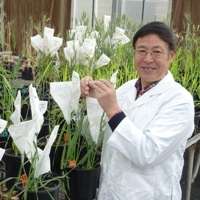Superfast plant breeding slashes production times, research finds

(Phys.org) —Many plant breeding projects - such as those aiming to increase food production - depend on getting 'pure lines' of plants but this can take a lot of time as, up until now, it depended on self-pollination for several generations.
Until recently, the fastest way to obtain 'pure lines' was to exploit differences in latitude or altitude, such as the 'shuttle breeding' technique developed by the 'Father of the Green Revolution', Nobel Laureate late Dr Norman Borlaug. However, even this technique - which involves growing plants at different places -achieved only two or three generations a year.
This is about to change as a team of international researchers, including a PhD student from The University of Western Australia, has developed a new technique that enables up to eight generations of wheat and nine generations of barley a year.
The team - involving researchers from China, CSIRO and UWA - has perfected a method of embryo culture. While embryo culture has been used before, this team was able to achieve stunning results by combining it with specially modified water, light, temperature, humidity and potting-mix management.
Their study has just been published in the international journal Euphytica.
Co-author, Associate Professor Guijun Yan, from UWA's School of Plant Biology and Institute of Agriculture, said a skilled technician in the team was able to dissect 60 plant embryos per hour from the developing grains.
"By dramatically shortening times required to obtain pure-line plant genotypes, our method could have wide applications in breeding and biological studies," Associate Professor Yan said.
Provided by University of Western Australia



















